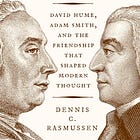Adam Smith, Session 2, Part 1: On Self-Command
When there is a lot less “me,” there can be a lot less suffering and a lot more flourishing.
We can imagine if The Theory of Moral Sentiments were published today, the book jacket might have this blurb: In his newest book, Adam Smith brilliantly illuminates the tension between our selfish desires and our capacity for noble action, offering timeless insights that promote both our own and societal flourishing.
Most modern readers would pass on such a book. But should they? For each of us, the voice of the narrator in our head is in service of the story of me, with all its passions and desires. And the story of me can be a troublesome barrier to our flourishing.
In The Wealth of Nations, Adam Smith famously taught that, in serving our own self-interest, we can also serve the interests of others. Importantly, from The Theory of Moral Sentiments, we know that Smith didn’t define self-interest the way our ego does.
The Irish philosopher and theater producer Terence Gray wrote under the pen name Wei Wu Wei. He asked, "Why are you unhappy?” Answering his own question, he wrote, “Because 99.9 percent of everything you think, and of everything you do, is for yourself—and there isn't one.”
We exist. But as David Hume taught us, our self-concept doesn’t exist. A meaningful life and a flourishing society are unattainable if our mental activity primarily serves an unreal self-image. If we are not the story of me, then we really don’t know ourselves.
The story of me mainly presents us as a good guy trying to overcome an evil world. Our story burdens us with mental afflictions. We have a choice: We can remain mindlessly ruled by our story or become more aware of our story and the burdens it places on us. The story of me is sure of why we feel the way we do.
Adam Smith shows us a way to rise above our certainty. As our attention is released on what is mentally troubling us, new possibilities and a greater sense of peace arise. When there is a lot less “me,” there can be a lot less suffering and a lot more flourishing.



